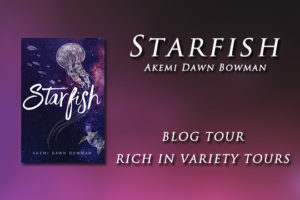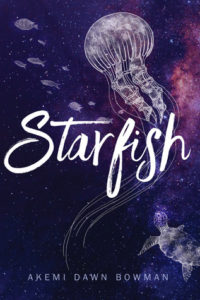Starfish is an amazing debut, that not only resonated with me on a deep level about the erasure of multi-racial culture, but also about a girl struggling to find her way and stand up for herself. (ALSO stay tuned to the end of this post for the giveaway)
Summary
Kiko’s family can be kind of a mess sometimes. Her picture-perfect mother is not supportive of her, needs everything to be about herself, and protects Kiko’s abusive uncle. Her two brothers operate on different wavelengths to her, one becoming a testament to their Japanese heritage and another somewhat abrasive, and her kind father is moving on with his life, married to another person with two new children. But Kiko navigates all of these family conflicts with one goal in mind – to get into her dream art school, Prism.
However, when she doesn’t get into Prism and the same abusive uncle moves in with her family, Kiko is desperate to get out. An opportunity presents itself to tour art schools on the west coast with her childhood friend and Kiko must challenge herself to move outside of her comfort zone, embrace who she is without her family, and follow her dreams – whatever they might be.
Review
TW: toxic maternal relationship, emotional abuse, suicide attempt, and sexual abuse
The absolute first thing that struck me about Starfish, is the way that Bowman interrogates and subtly explores the racism and erasure of multi-racial experiences prevalent in today’s society. Kiko finds it difficult to fit into both American and Japanese culture – feeling shut out of both and unable to fulfill their standards of what a ‘valid’ identity would be. Her struggle manifests itself in a variety of different ways, that not only include her brother’s embrace of Japanese representation, but also the ways her fellow students exclude her from certain identities.
 Kiko’s Multi-Racial Identity & Struggles
Kiko’s Multi-Racial Identity & Struggles
There was such an insightful discussion of the racism and prejudice from a myriad of characters: her best friend, her Japanese mentor (but seriously, come be my mentor), and her own family. I deeply appreciated the ways Bowman illustrates the ways Kiko feels excluded from both cultures: unable to find herself in beauty magazines, and unwilling to be seen as ‘exotic’. Being multi-racial in the sense that I am an adopted Chinese-American, these instances of erasure and challenges to belong touched a chord within me – all these moments of doubt, guilt, and loneliness that I too have had in my life. Just for this alone, I would give the book all the stars in the world I could, because it just encapsulated my feelings so succinctly.
Kiko
But besides Bowman’s explorations of racism and erasure, Kiko is a phenomenal character. She is intelligent, soft-spoken, and struggles to find herself, her direction, and her inner voice. Her narrative style is engaging and moving. I could see myself in Kiko, not only because of her struggles regarding her multi-racial experiences, but also in her inability to speak her mind and to confront those who hurt her. (Don’t even get me started on how emotional it was to read about the echoes of her trauma or even the way certain people excuse that behavior – it infuriated me). Kiko also suffers from panic attacks and social anxiety, which is really well dealt with. This representation was full of nuance and also complexity.
In these ways, I think that Kiko represents a lot of girls growing up in society where they are told that their protests are not ‘valid’ or that they should be ‘easy going’ and amicable. And so for all of these reasons, I felt a deep connection with Kiko and her journey throughout the book. As a whole, Kiko defies a whole cast of tropes/expectations. Without spoilers, I won’t get into it, but her path to agency and self-confidence is one that celebrates these characteristics.
Themes
At times this is a heartbreaking book to read, because of the ways we so completely connect – not only to the characters – but also to that feeling of being pushed aside, of being belittled, or of being ignored and in pain. But there’s also a hopefulness, an optimism, and resilience, that bring you right back up. Bowman also explores themes of family: what is family? How do we form our families? And how are we to be a part of them or leave them?
 There were also a whole list of things I loved, that were all about the little things: the typography, or the drawings of sea creatures. Or the way that there is so much discussion of art as a medium of expression and storytelling (give me all the artistic sketches please). But also the meaning of the title! The combination of these factors produces such a phenomenal book. I have already pre-ordered a copy of the book, so I can have a physical copy, because this book is beautiful on the inside and out. It is also a book where, even though we are not the exact same identities, I can see so many fragments of myself and the experiences I went through as a girl.
There were also a whole list of things I loved, that were all about the little things: the typography, or the drawings of sea creatures. Or the way that there is so much discussion of art as a medium of expression and storytelling (give me all the artistic sketches please). But also the meaning of the title! The combination of these factors produces such a phenomenal book. I have already pre-ordered a copy of the book, so I can have a physical copy, because this book is beautiful on the inside and out. It is also a book where, even though we are not the exact same identities, I can see so many fragments of myself and the experiences I went through as a girl.
Overall
Time will fly by when you read this book. I read it in a day, because I was utterly engrossed and could not put it down. For these reasons, I whole heartedly encourage, no insist, you read this book because of the deep meaning it has for all those growing up in a world that is intolerant of multi-racial identities and for all the girls out there who are struggling to find their own voice and speak their mind. This one’s for you.
You should pick up Starfish on Amazon(US), your local indie, and add it to Goodreads. (But also go ahead and pre-order it now)
Disclaimer: I received a copy of this book in exchange for an honest review from Netgalley.
Giveaway
Discussion
Favorite book with an animal name in the title?
Subscribe for more reviews
I’ve seen in a couple of other reviews that there’s some ableist language use within the book – did you pick up on any of this yourself? It’s putting me off reading it, but I really wanted to 🙁
Sorry I just saw this, but we did discuss it on Twitter 😀
Great job with the TW. This is the first warning I have seen for this one. I like your review and am excited to read this one!
Thank you 🙂 LMK your thoughts when you do!
I will! <3